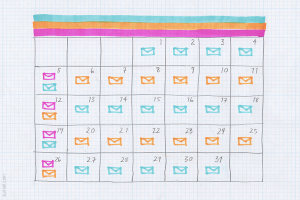Editors note: This post could be the last in this annual series. Why? As sometimes happens, what is happening in the field can get ahead of the state education department, and the way that data is collected. From our work in the field, we witness an increase in the number of school media specialists being reassigned to new titles and new duties. Tech Integrationist or Digital Resource Specialist, Guide, or Coach are some of the assigned titles. It is unclear to us at CMLE how personnel in 265 schools are being reported to MDE; questioning the validity of our data set.
 Could you hear us crunching the data? This is the sixth year that CMLE has been pulling the Minnesota Department of Education (MDE) data and studying the slow decline of school library media specialists in our CMLE twelve-county region. Sharing the data is (was) the logical thing to do, but CMLE has found little appetite from the field in addressing this issue. Even those in the field feel unable to propose ideas, and the perennial question is: Whose problem is this to solve? CMLE can serve as a voice for school media centers, but has no authority or power to correct this lack of high quality staffing.
Could you hear us crunching the data? This is the sixth year that CMLE has been pulling the Minnesota Department of Education (MDE) data and studying the slow decline of school library media specialists in our CMLE twelve-county region. Sharing the data is (was) the logical thing to do, but CMLE has found little appetite from the field in addressing this issue. Even those in the field feel unable to propose ideas, and the perennial question is: Whose problem is this to solve? CMLE can serve as a voice for school media centers, but has no authority or power to correct this lack of high quality staffing.
It stands to reason that if there is inadequate media specialist staffing in high schools, students may not be prepared with the skills they need to be successful in college. Will middle schoolers be prepared to do high school work, and when students have no library program at school, are they simply going to the public library for assistance? Are the public libraries funded or staffed to absorb this work on a large scale? Everyone is stretched for resources, so it is critical that K-12, public, and academic libraries all step up to do their part. Do school superintendents understand this? It amazes me that the public and academic libraries don’t push back when they are forced to pick up the additional weight as a result of this dodged responsibility. Is this fair, is this right?
Without further ado, here is data for Aitkin, Benton, Chisago, Isanti, Kanabec, Mille Lacs, Morrison, Pine, Sherburne, Stearns, Todd and Wright counties in MN. In a nutshell, …..
- 97 individual schools (45%) in Central MN have no licensed media specialist. This compares with 90 in 2015, 79 individual schools in 2014, 53 in 2013, and 48 in 2012.
- 52% of the schools without a media specialist are middle, secondary, or high schools. A whopping 76% of secondary schools are functioning without licensed staff!
- 47 elementary schools have no media specialist (compared to 43 last year, 38 in 2014 and 28 in 2013), yet as far as I know, we are still focused statewide on demonstrating reading proficiency by 3rd grade!
- 18 out of 52 districts (35%) have no media specialist in any school in the district. This compares to 16 in 2014 & 2015, 14 in 2013, and 9 in 2012!
- Is there any good news? Yes. The great news is that 35% of CMLE schools still have a full time media specialist, a number which is holding. Schools with a full-blown school media program appear to value it, and see the need.
According to public 2015-2016 MDE data, here are the CMLE school districts with no licensed media specialists in any school: Aitkin, Annandale, Belgrade-Brooten-Elrosa, Bertha Hewitt, Braham, Browerville, Eagle Valley, East Central, Foley, Hinckley-Finlayson, Kimball, Long Prairie-Grey Eagle, Maple Lake, McGregor, Royalton, Staples-Motley, Swanville, and Willow River. Are parents in these districts aware of this issue?
New to the list this year are shown in orange. Congratulations to Onamia, who graduated off this list!
In the past, CMLE used this data in its advocacy work, in targeting its programming, and in working statewide to bring attention to this growing problem. All Minnesota students deserve a high quality, K-12 academic experience that prepares them for the next step in their life. We need students to be able to proficiently use the research process and to think critically about competing sources of information. These are key lifelong skills needed by all high-functioning members of society.
Patricia Post
CMLE Executive Director
Image credit: http://tinyurl.com/mklc22b, licensed under CC BY-NC-ND 2.0
 Most book-lovers agree that print books have a certain beauty, and some even enjoy the smell of a book, library, or bookstore. But have you ever heard of marbled book art?
Most book-lovers agree that print books have a certain beauty, and some even enjoy the smell of a book, library, or bookstore. But have you ever heard of marbled book art?



